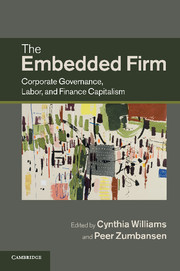Book contents
- Frontmatter
- Contents
- Figures
- Tables
- Contributors
- 1 Introduction: corporate governance after the ‘end of history’
- Part I Historical trajectories of business and regulation
- Part II New interests, new shareholder constellations, new landscapes
- 8 Beyond the Berle and Means paradigm
- 9 Pension funds as owners and as financial intermediaries
- 10 Credit derivatives market design
- 11 The EU Takeovers Directive: a shareholder or stakeholder model?
- 12 “Law and finance”
- Part III Labor’s evolution in the new economy
- Part IV The transnational embedded firm and the financial crisis
- Part V Conclusion
- Index
- References
11 - The EU Takeovers Directive: a shareholder or stakeholder model?
from Part II - New interests, new shareholder constellations, new landscapes
Published online by Cambridge University Press: 07 September 2011
- Frontmatter
- Contents
- Figures
- Tables
- Contributors
- 1 Introduction: corporate governance after the ‘end of history’
- Part I Historical trajectories of business and regulation
- Part II New interests, new shareholder constellations, new landscapes
- 8 Beyond the Berle and Means paradigm
- 9 Pension funds as owners and as financial intermediaries
- 10 Credit derivatives market design
- 11 The EU Takeovers Directive: a shareholder or stakeholder model?
- 12 “Law and finance”
- Part III Labor’s evolution in the new economy
- Part IV The transnational embedded firm and the financial crisis
- Part V Conclusion
- Index
- References
Summary
Introduction
The year 2009 marked the fifth anniversary of the adoption of the EU Takeovers Directive 2004/25/EC (‘the Directive’). This affords us an opportunity to contemplate its contribution to corporate governance generally and stakeholder welfare in particular and also to consider its continuing fitness for purpose. In this chapter, the impact of the Directive on non-shareholder stakeholders will be considered. While the stated purpose of the Directive is to coordinate certain safeguards required by Member States of listed companies ‘for the protection of the interests of members and others’, the emphasis in the Directive is clearly on shareholders. The main substantive provisions deal with the protection of minority shareholders by means of the mandatory bid (Article 5) and the squeeze out and sell out rights (Articles 15 and 16), restrictions on the target board denying shareholders the opportunity to decide on the merits of a bid (Article 9) and restrictions on the transfer of securities and on voting rights (Article 11). This focus in takeover regulation on shareholders almost exclusively is not restricted to transnational regulation but is also typical of national regulation. For example the City Code on Takeovers and Mergers in the UK similarly acknowledges its primary responsibility to be the protection of shareholders. This concentration on shareholders in the Directive is symptomatic of a wider trend in corporate governance to confer pride of place to shareholders. The Directive also exemplifies the manner in which non-shareholder stakeholders are included in European corporate governance regulations. The only other group of stakeholders expressly referred to in the Directive is employees and the only rights conferred on this group are information rights.
Of course the environment in the wake of the global financial crisis is substantially different from that in 2004. Although the crisis was the result of ‘a perfect storm of economic conditions’ which included the sub-prime mortgage crisis, the property collapse, the liquidity crisis, market volatility and an accommodating accounting and regulatory environment, most commentators agree that corporate governance failings played a contributory role. In particular, the chronic and reckless risk-taking by the management of banks has been criticized. The banks’ remuneration policies both created the high risk environment and rewarded managers and directors for their role in it. As a result there have been calls for greater corporate accountability and increased controls over public companies. The crisis has also highlighted the dangers of focusing exclusively on shareholder return as opposed to adopting a wider stakeholder perspective. The chapter thus considers whether it would be appropriate and indeed possible for the Directive to accommodate a more ‘enlightened’ shareholder approach.
- Type
- Chapter
- Information
- The Embedded FirmCorporate Governance, Labor, and Finance Capitalism, pp. 233 - 255Publisher: Cambridge University PressPrint publication year: 2011
References
- 1
- Cited by

